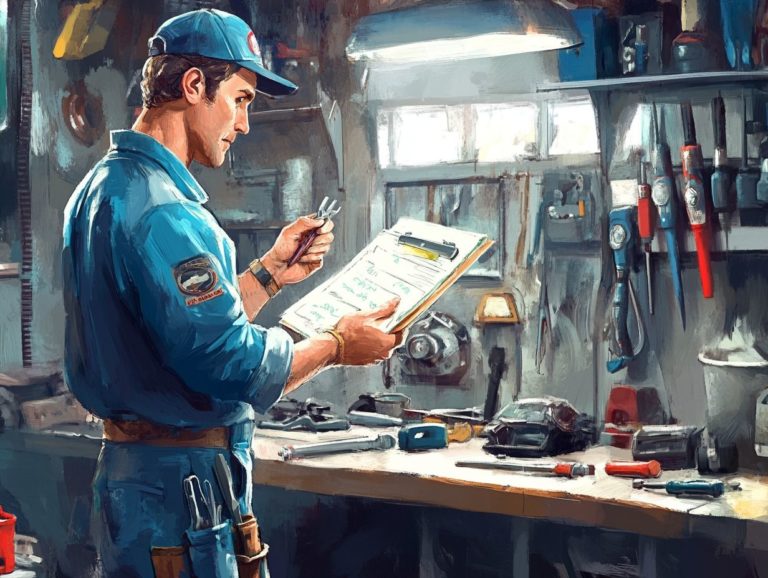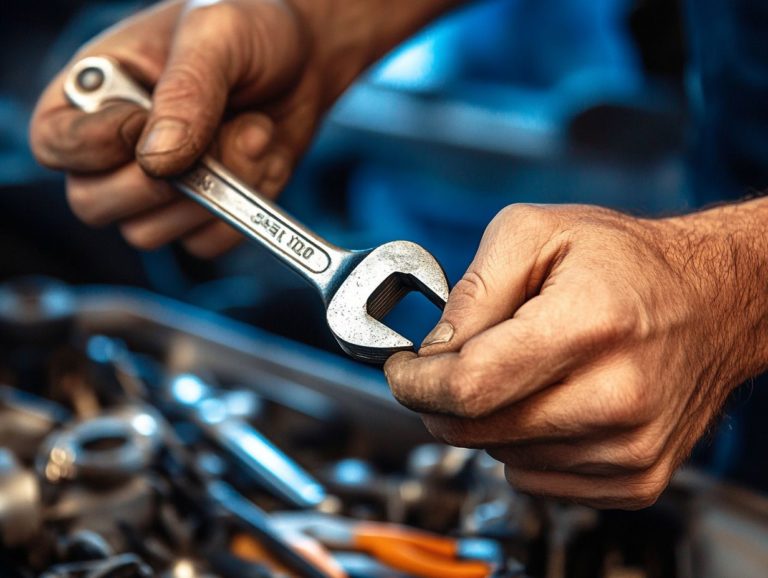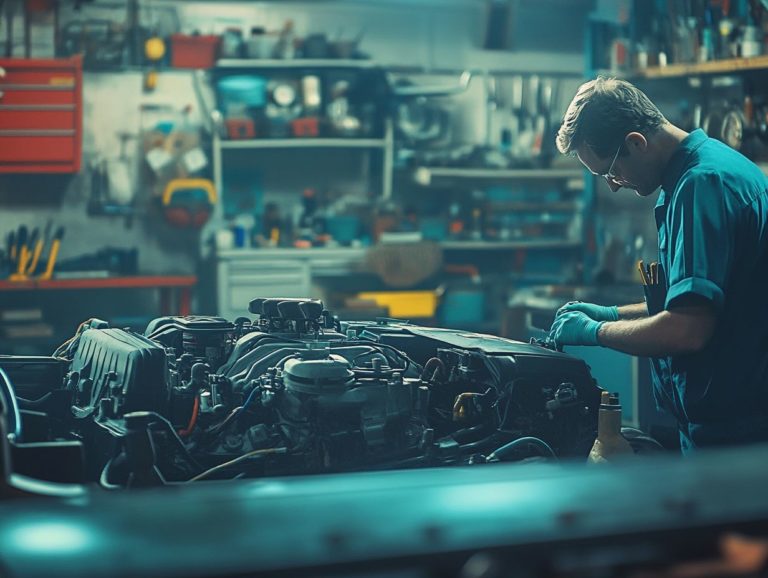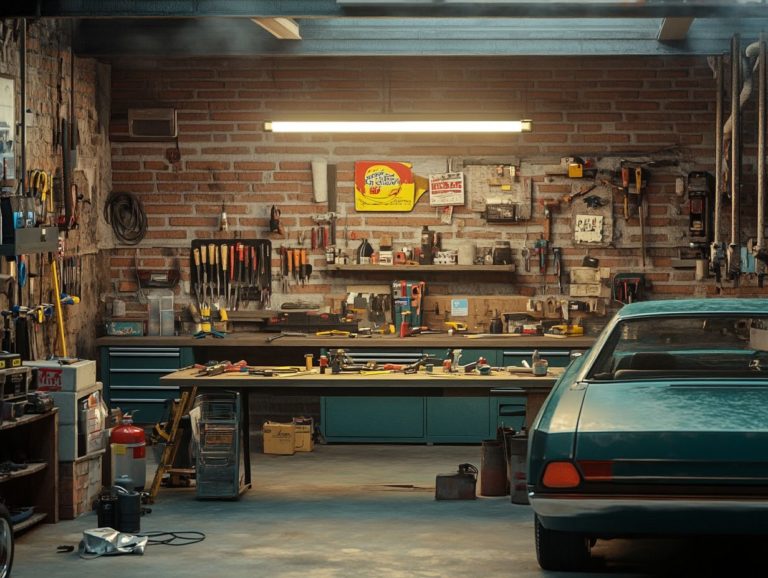How to Handle Common Winter Car Repairs
Winter is just around the corner! Your vehicle needs to be prepared for distinct challenges.
The biting cold affects battery performance, and icy roads make driving more dangerous.
This guide covers common winter car repairs and essential maintenance tips.
You will find practical steps for winterizing your vehicle and handling emergencies.
Contents
- Key Takeaways:
- Common Winter Car Repairs
- Preparing for Winter Car Maintenance
- Handling Winter Driving Hazards
- Winterizing Your Car
- Dealing with Cold Weather Car Troubles
- Frequently Asked Questions
- What are some common winter car repairs that I should know how to handle?
- How can I prevent my car battery from dying in the winter?
- What should I do if my car’s tire pressure is low in the winter?
- How often should I replace my windshield wipers in the winter?
- What type of windshield washer fluid should I use in the winter?
- Can I handle winter car repairs on my own, or should I take my car to a professional?
Key Takeaways:
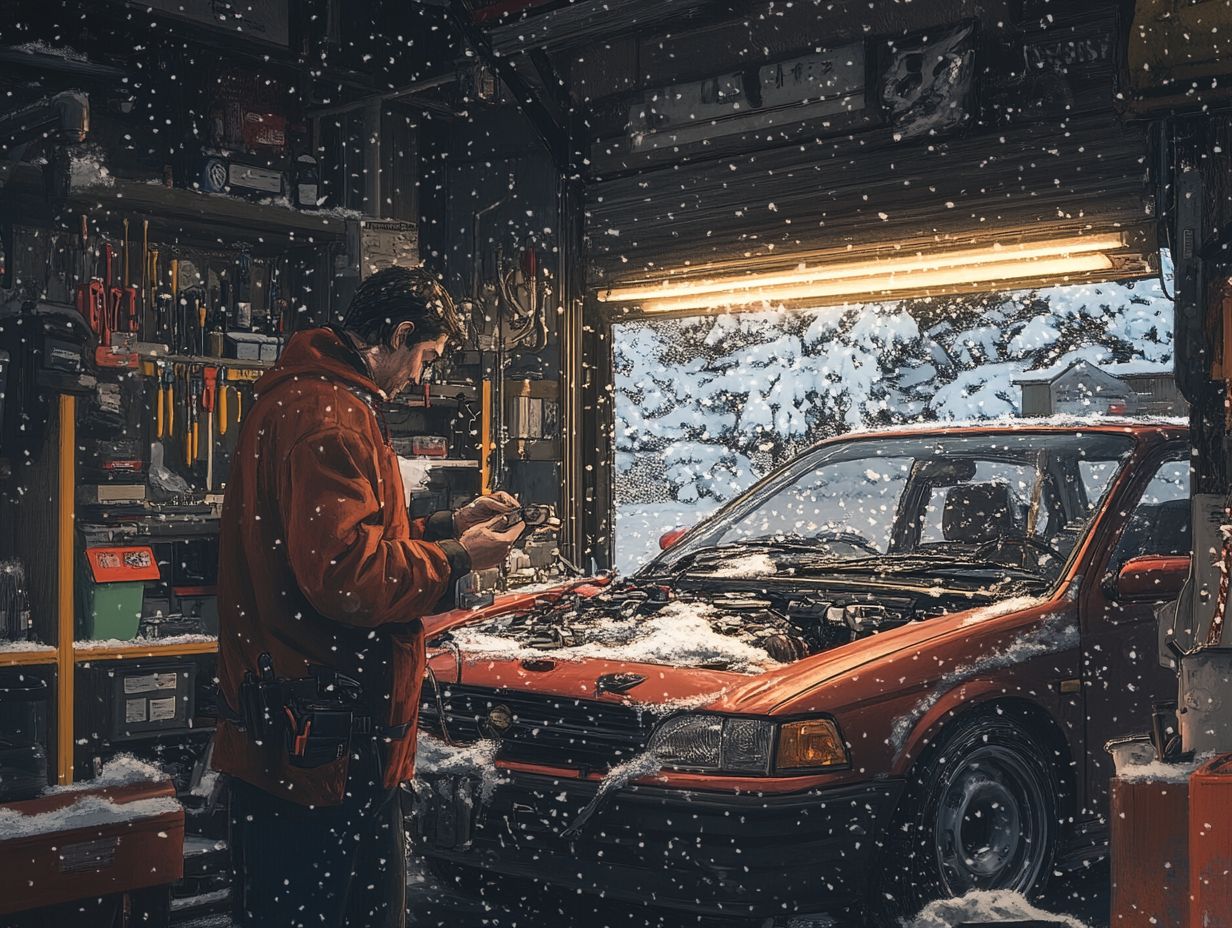
- Stay ahead of common winter car repairs by regularly checking for issues and addressing them promptly.
- Prepare your car for the winter season with essential maintenance such as checking your battery, tires, and fluids.
- Be prepared for winter driving hazards by practicing safe driving techniques and having an emergency kit in your car for cold weather troubles.
Common Winter Car Repairs
As winter weather sets in, it’s crucial to recognize how to stay prepared for common car repairs that may arise due to unforgiving conditions.
In places like Colorado and Oklahoma City, your vehicle is especially prone to cold-weather issues.
By identifying these typical car concerns, you can protect yourself from unexpected breakdowns and costly repairs, especially when you rely on your vehicle most during winter. Knowing how to prepare your car for winter can make a significant difference in your vehicle’s performance.
Identifying and Addressing Common Issues
Identifying and addressing common winter issues is vital for the longevity and performance of your vehicle.
As temperatures drop, challenges like dead batteries can become problematic.
Check if your battery holds a charge effectively. Don t forget to replace your windshield wiper blades and refill your wiper fluid; these steps are key for good visibility.
It’s vital to keep an eye on your tire pressure, as it significantly impacts traction on slick roads.
By managing these factors, you enhance your winter driving experience and minimize the risk of unexpected breakdowns, especially by being aware of the top 10 most common car repairs you should know.
Preparing for Winter Car Maintenance
Preparing for winter car maintenance is essential to ensure your vehicle can handle seasonal challenges, including maintaining your car in extreme weather conditions.
Regular check-ups keep your car running smoothly, helping you sidestep common car troubles.
This includes checking vital fluids like fresh oil and coolant, and inspecting belts and hoses for wear and tear.
Essential Maintenance Tips
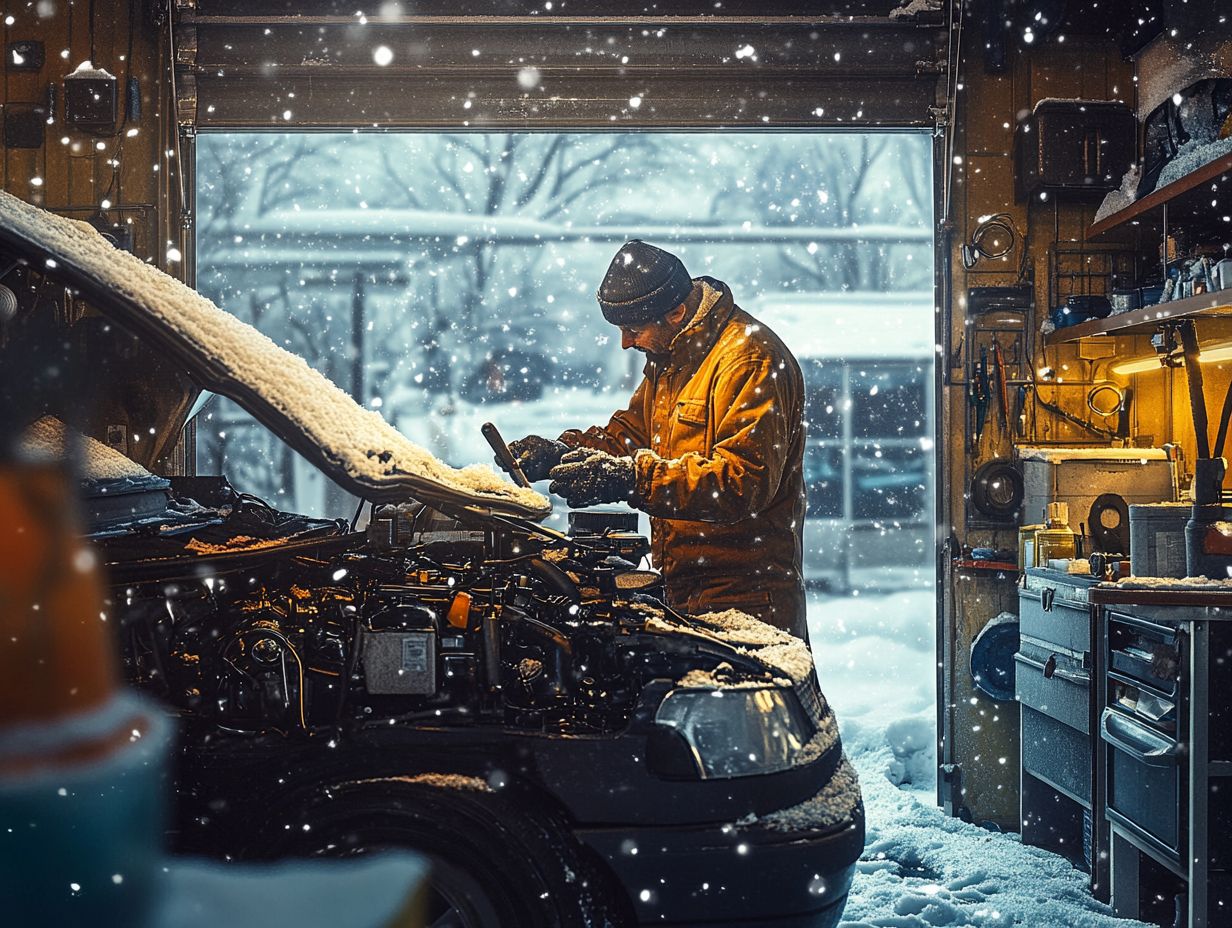
Essential maintenance tips during winter can boost your car’s performance and safety on the road.
Keep an emergency kit in your car with items like a flashlight, warm blankets, and non-perishable snacks, so you re ready for unexpected breakdowns.
Regularly cleaning your vehicle is crucial, especially to remove magnesium chloride used for de-icing, which can cause corrosion.
Opt for a touchless car wash to help protect your paint job.
These straightforward practices enhance drivability and can prevent issues, helping you learn how to manage common car repairs on a budget, ultimately saving you time and money.
Handling Winter Driving Hazards
Handling winter driving hazards is crucial for ensuring your safety and performance on the road, particularly in areas that face heavy snow and icy conditions during the winter season. By understanding how to navigate these challenges, you can significantly diminish the risk of vehicle issues and accidents.
It s essential to prepare yourself by being aware of the common risks that winter weather presents, such as reduced traction and visibility. These factors can quickly transform an ordinary drive into a perilous situation. Staying informed is key to a safer journey.
Essential Tips for Winter Driving Safety
Tips for safe winter driving are essential for preventing accidents and ensuring a smooth journey during the cold season.
One of the most crucial practices you should remember is maintaining a safe following distance. This gives you the necessary reaction time on those icy roads. Equipping your vehicle with special tires for winter significantly enhances traction and control, making it much easier to navigate slippery conditions.
It s also wise to prepare a winter emergency kit containing items like:
- Blankets
- Flashlights
- Non-perishable snacks
These essentials can be lifesavers</b! Don t wait prepare your kit today!
Common issues, like battery failure, tend to be more frequent in the colder months, so checking your vehicle regularly for any problems is key. By keeping your vehicle in top shape, you can minimize risks and ensure it runs smoothly throughout the difficult weather.
Winterizing Your Car
Winterizing your car is a smart move, ensuring your vehicle is fully prepared to take on the difficult weather, especially in regions prone to snow and ice. A well-winterized car not only boosts performance but also significantly reduces the chances of encountering vehicle issues during winter driving.
It’s essential to stock up on vital winter tools such as ice scrapers and snow brushes. Make sure your wiper fluid works in low temperatures to keep your view clear.
Steps for Protecting Your Vehicle
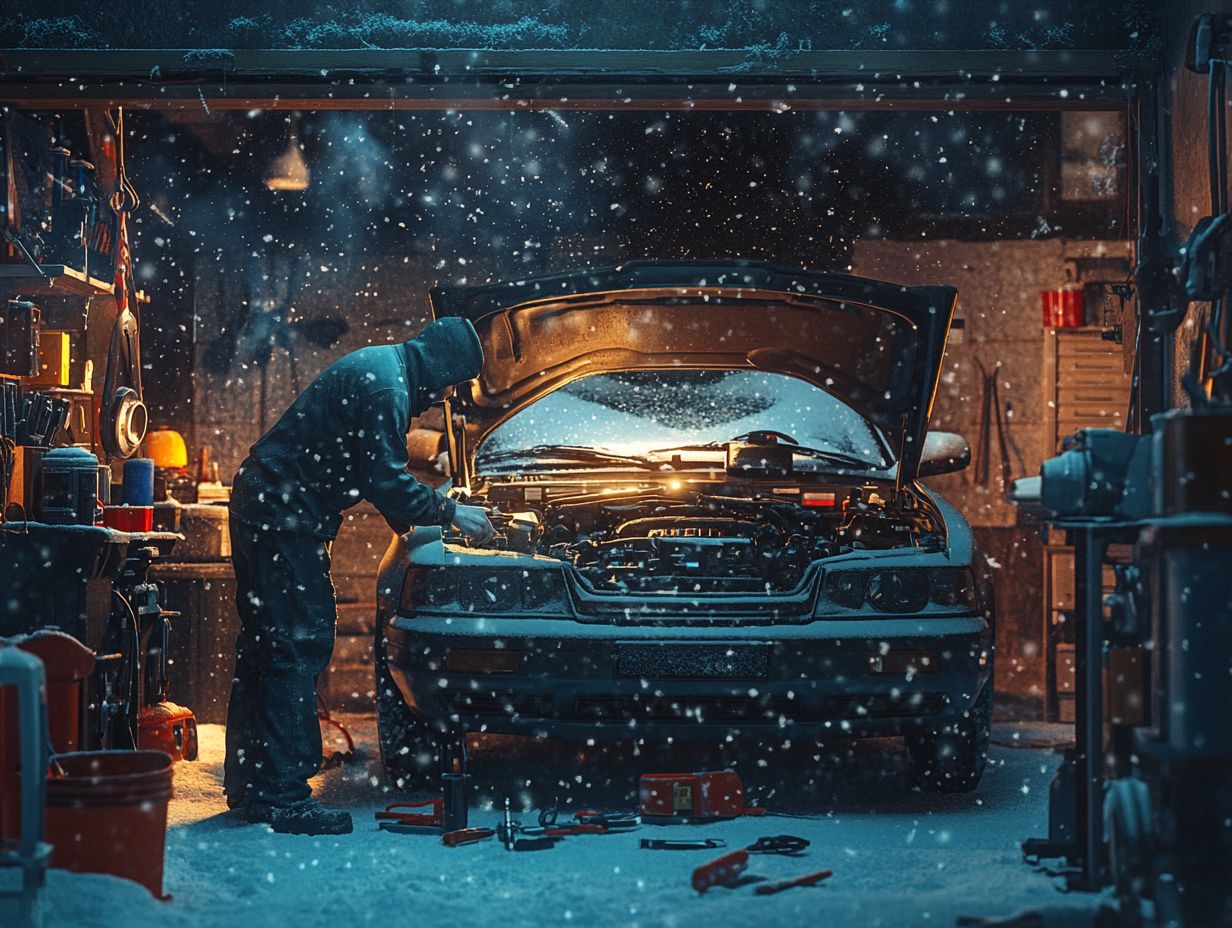
Protecting your vehicle from the unforgiving winter elements requires a few essential steps to ensure its longevity and safe operation.
- Start by regularly inspecting and replacing those winter windshield wiper blades; this not only enhances your visibility during snowstorms but also grants you peace of mind.
- It s equally crucial to check your fluid levels make sure your antifreeze (a liquid that prevents your engine’s water from freezing) and windshield washer fluid are topped off to prevent any freezing mishaps.
- Don t forget to prepare your vehicle for the cold by switching to winter tires, which offer better traction on those icy roads.
These proactive measures work together to shield your vehicle from common issues like battery failure or decreased braking efficiency, ultimately making your winter travels safer and far less stressful.
Dealing with Cold Weather Car Troubles
Navigating cold weather car troubles can be quite the challenge, but a little preparedness can transform your experience and help you understand the most common car repairs, ensuring a safe, efficient response to any emergencies that may arise on the road.
In frigid conditions, vehicles become more prone to issues like a dead battery or frozen fluids, leaving you stranded or staring down costly repairs. By keeping a well-stocked emergency kit in your vehicle, you can effectively tackle these challenges and lessen the impact of common car problems.
Share your own winter driving experiences or tips to foster community engagement!
How to Handle Emergencies on the Road
Knowing how to handle emergencies on the road in winter is crucial. Your safety and the safety of others depend on it.
Staying calm and focused allows you to make sound decisions even in the most stressful situations. Preparing an emergency kit in advance can greatly alleviate the stress of unexpected breakdowns or accidents. Your kit should include essential items such as:
- Blankets
- Water
- Non-perishable snacks
- A flashlight
- Basic tools
Being familiar with these tools ensures you can use them effectively when the moment arises. Having access to roadside assistance services offers invaluable support, helping you when your car breaks down and providing peace of mind.
Frequently Asked Questions
What are some common winter car repairs that I should know how to handle?
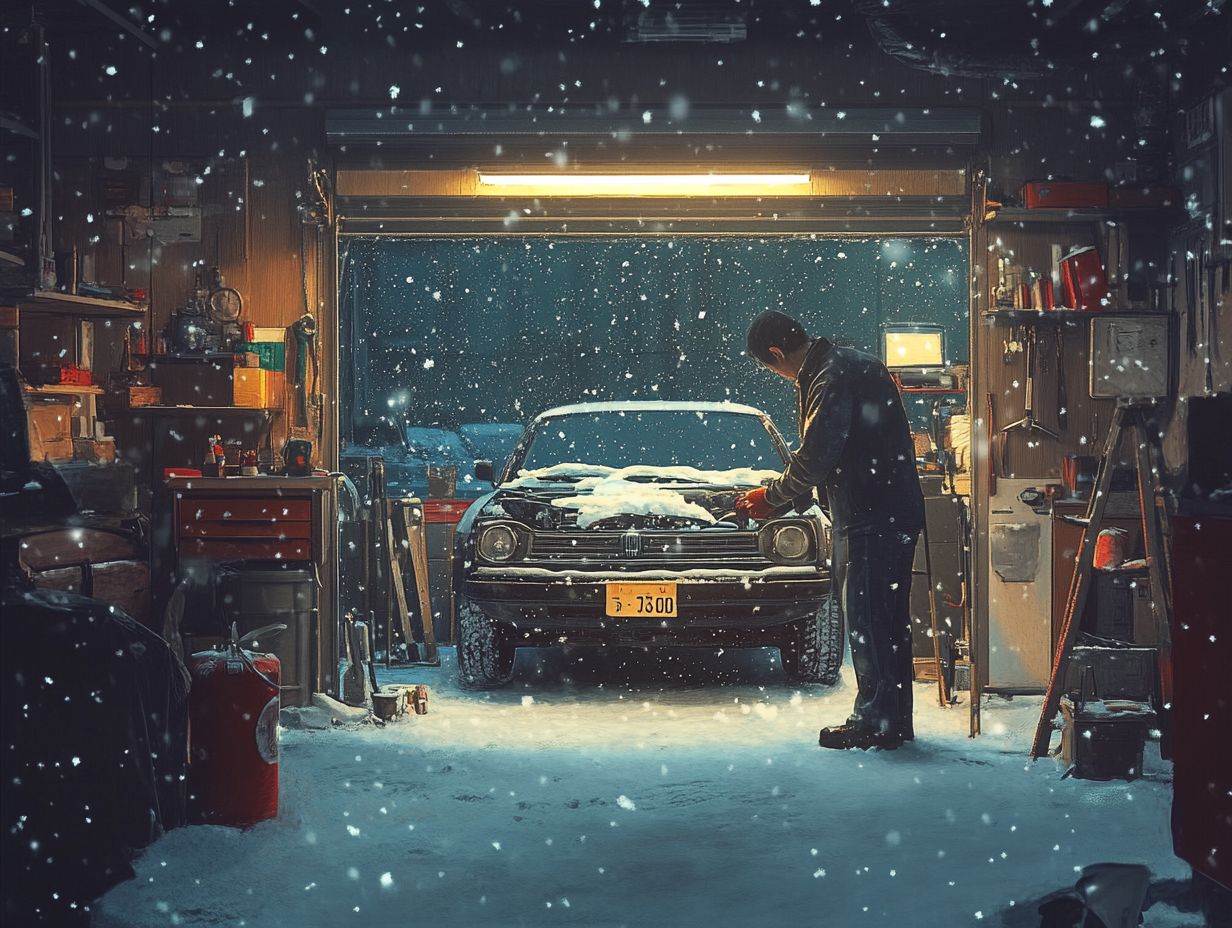
Some common winter car repairs include replacing or recharging your car’s battery, checking and replacing tire pressure, and inspecting windshield wipers and fluid. For more detailed guidance, check out how to maintain your car during winter.
How can I prevent my car battery from dying in the winter?
To prevent your car battery from dying in winter, keep it clean and free of corrosion. Drive your car regularly to keep the battery charged, and consider investing in a battery blanket or insulation to keep it warm.
What should I do if my car’s tire pressure is low in the winter?
If your car’s tire pressure is low in winter, check the pressure with a tire gauge and add air if necessary. Don t forget to check for punctures or tire damage that might be causing low pressure!
How often should I replace my windshield wipers in the winter?
It is recommended to replace your windshield wipers every 6-12 months. In winter, you may need to replace them more frequently due to harsh weather conditions. Keep an eye out for signs of damage or wear on your wipers and replace them promptly to ensure clear visibility!
What type of windshield washer fluid should I use in the winter?
It is important to use windshield washer fluid specifically designed for winter weather. Look for a fluid labeled as “de-icing” or “anti-freeze” to help prevent your wiper fluid from freezing in cold temperatures.
Can I handle winter car repairs on my own, or should I take my car to a professional?
Some winter car repairs, such as checking and replacing fluid levels, can be easily done on your own. However, for more complicated repairs, it’s best to consult a professional mechanic. You can also find helpful tips on how to prepare for common seasonal repairs to ensure your car stays in top condition during the colder months.
In summary, being prepared and knowing how to handle car emergencies in winter can significantly enhance your safety on the road. Always keep your emergency kit stocked and stay informed about your vehicle’s needs.

